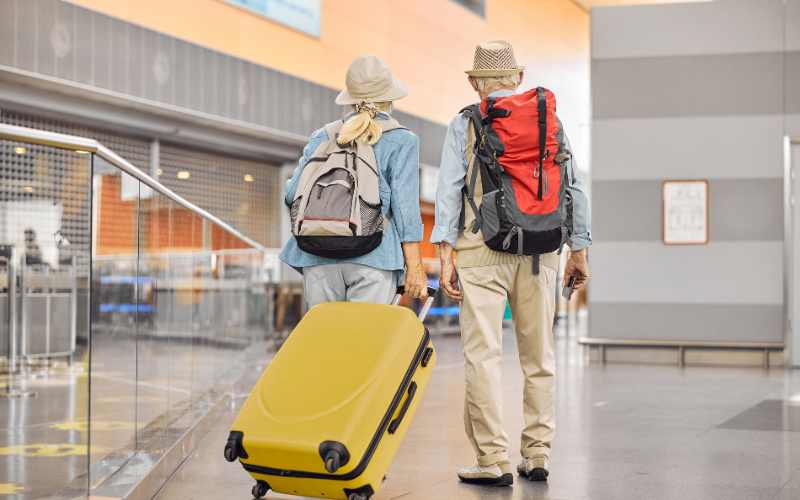Travel insurance for over 60s

The purpose of travel insurance is to cover the cost of the unforeseen – protecting yourself and your belongings. Travel insurance covers things such as injury and illness and loss or theft of your belongings whilst you’re traveling and on holiday.
It's also designed to cover your finances if you have to cancel your trip before you go, or if you need to go home early due to an emergency.
We understand that going on holiday is a big part of living later life well. Unfortunately, as we age, it seems that insurance goes up in price - the main reason for this is that insurance companies assume you’re more likely to come across medical issues while on a trip than someone younger.
Even if you have any pre-existing medical conditions, we hope these tips allow you to travel with confidence.
Here are some tips to get the best deal for you:
-
Get your travel insurance when you book your holiday - this way you have your cover in place if something happens and stops you from going, in addition to cover for the holiday.
-
Make sure you declare all medical conditions - if you don’t disclose this information, you’re more likely to not be fully covered.
-
Don’t forget you can get a free Global Health Insurance Card (GHIC) card (which replaced the European Health Insurance Card (EHIC) in 2021. The card entitles you to treatment in state-run hospitals in the EU at the same cost as a local would pay. This should be used as an extra to your insurance. Visit the GOV.UK website to apply for your GHIC
-
Always check the fine print and exclusions. For example, if you were to leave your baggage unattended, some insurance companies won’t cover for loss of belongings.
-
If you’re traveling with a group, it might be cheaper to get separate cover rather than a group policy. Group policies tend to be calculated using the oldest person in the group and/or if someone has a medical condition which would put up the premium for everyone else. Always check your options, but it might be cheaper to get individual policies.
-
Double-check if you get holiday insurance with your bank. Some banks offer insurance cover and things like breakdown cover with their premium accounts (you usually pay a monthly/annual fee to get this benefit).
-
If you’re heading off on a cruise or skiing holiday you usually need extra cover for this so make sure you check your policy when booking and add on the right cover
-
If you need to claim for a cancellation, you need proof that your operator or airline won’t refund you first. This is usually within the fine print of an insurance policy known as 'recoverable costs', which essentially means you need to prove that you can't claim back those amounts elsewhere.
Don’t know whether to choose single trip vs annual trip insurance?
This is all dependent on how many times you’re going on holiday and how long. For those under 75, Money Saving Expert recommends that if you go away two or more times a year, the annual policies are worth getting. When you’re over 75, insurance premiums are high, and annual policies only become worthwhile if you go on holiday 3-4 times a year.
It's always worth double-checking your options and using a comparison site.
Ways to give yourself extra protection when booking a holiday
-
Book easily-canceled hotel and flight options so it’s free or low cost to cancel or re-schedule.
-
Consider paying using a credit card – this offers more protection on your purchase as it comes under Section 75 refund rules (Free protection for credit card spending on items over £100). You still get some protection using a debit card, but some companies might challenge this.
-
Package holidays can offer greater protection - if an airline or accommodation provider cancels, you're entitled to a refund.
How to claim your travel insurance
If you understand the terms and the excesses on your policy, claiming on your insurance should be simple.
Follow these five steps if you need to claim:
-
Submit your claim as soon as possible. Contact your insurer as soon as you can. Your policy might have a set window of time to make a claim after the event/holiday you’re claiming for.
-
If you need treatment whilst on holiday, contact your insurer to accept a medical claim before you get treatment (when it's not an emergency). For example, if you sprained your ankle, call your insurer. If they accept the claim, you're less likely to be faced with a rejected claim after your holiday. Make sure you don’t delay treatment if it's an emergency.
-
If you want to claim for theft, notify the police as soon as you can. Your insurance company is likely to ask for a crime reference number (or country equivalent) to make a successful claim, they may also have a window of time - likely to be 24 hours in which you should have reported the crime.
-
If you are claiming for lost luggage or delay, remember to keep all your receipts of any essential items you have bought while waiting, like food and drink. Many insurers allow you to add these expenses to a claim and may ask for receipts as proof.
-
Complain if you feel your claim was unfairly rejected. If your insurance company rejects your claim, and you think it has done so wrongly you can contact the Financial Ombudsman. They offer a free and easy-to-use service that settles complaints between consumers and businesses. They are impartial and independent.
Page last updated: May 2023.
MHA in your community
Find the care home, retirement community, or support group that’s right for you

